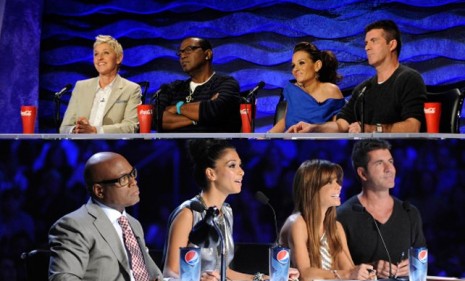The X Factor vs. American Idol: 6 key differences
Simon Cowell and Paula Abdul are back assessing hopeful singers and sipping cola. How is this reality competition any different from Idol?

A free daily email with the biggest news stories of the day – and the best features from TheWeek.com
You are now subscribed
Your newsletter sign-up was successful
The X Factor is a Fox singing competition that features Simon Cowell and Paula Abdul as judges (alongside Pussycat Doll Nicole Scherzinger and record exec L.A. Reid), and rewards its winner with a lavish recording contract. Ever since promos for the new reality series began airing last spring, inquiring minds have been asking: So... how is this any different from American Idol? The first of The X Factor's two-part premiere aired Wednesday night and, while it's distinctly Idol-esque, some twists distinguish it. Here, six ways the shows differ:
1. The rules
One big difference: While American Idol is strictly open to solo singers, duos and groups can compete on The X Factor. And, unlike American Idol, which requires that contestants be between 15 and 28 years old, The X Factor's minimum age is 12 and there's no upper limit. This has its advantages and disadvantages. Sassy 13-year-old Rachel Crow "stole this show" with her audition of Duffy's "Mercy," says Sarah Maloy at Billboard, while 42-year-old Stacy Francis (who'd repeatedly been told she was "too old" to try singing professionally) brought the audience — not to mention herself — to tears with her fearless rendition of "Natural Woman," which Simon called "one of the best auditions" he's ever heard. However, an audition by a tone-deaf and clearly exploited senior-citizen duo served just to "mock the aged," says Neil Genzlinger at The New York Times. "If I were in charge of AARP, I'd be contemplating a boycott right now."
The Week
Escape your echo chamber. Get the facts behind the news, plus analysis from multiple perspectives.

Sign up for The Week's Free Newsletters
From our morning news briefing to a weekly Good News Newsletter, get the best of The Week delivered directly to your inbox.
From our morning news briefing to a weekly Good News Newsletter, get the best of The Week delivered directly to your inbox.
2. The stakes
The X Factor winner will take home the biggest prize offered by any American TV talent competition: A $5 million recording contract (not to mention a starring role in a Pepsi commercial that will air at this year's Super Bowl). Cowell and his cohorts seem to take the responsibility of dispensing such serious money very seriously. "The judges keep mentioning the $5 million like they're venture capitalists interviewing kids who run Internet start-ups," says Lisa de Moraes at The Washington Post. Idol winners are awarded a $1 million contract — and, these days, a blink-and-you'll-miss-it recording career.
3. The sponsors
Coca-Cola has long been American Idol's signature sponsor, compelling its judges to sip liquids from large cups emblazoned with Coke logos. The X Factor has conspicuously partnered with Coke's arch-rival, Pepsi. Result: Eerily familiar large cups, different logo.
A free daily email with the biggest news stories of the day – and the best features from TheWeek.com
4. The mentoring
After receiving at least three "yes" votes from The X Factor's four judges, says Mike McComb at TV Latest, contestants move on to Boot Camp where they "learn choreography, sing for their life, and step up their game." They are grouped into four categories — Males under 30, Females under 30, Singers over 30, and Groups — each of which is assigned to a particular judge who not only selects three acts to compete in the live shows, but actively mentors them throughout the competition. "The show is designed to allow the judges to bend some newcomer into a star," says Ken Tucker at Entertainment Weekly.
5. The arena atmosphere
Idol hopefuls famously audition a cappella versions of songs in "crummy rooms in hotels" across the U.S., says de Moraes, but X Factor auditions have an "arena rock" vibe. Contestants perform with prerecorded musical backing on a massive, swallowing stage before an audience of loudly-cheering thousands. "One thing's for sure — no talented but quirky, jazz-y, folk-y performers are going to make it through this audition process."
6. Simon's sincerity
Though Cowell hasn't lost his razor edge, he appears more open to moments of vulnerability, says Tucker. The climactic final audition of Chris Rene, a former drug addict just 70 days sober, was "too raw, too real" for the judges to revert to the "sharp, realpolitick" critiques. Clearly moved by Rene's earnest hip-hop performance — and deafened by the crowd's screams of support — Cowell told him with "sudden, shocking sincerity": "Maybe you need the show and maybe we need you."
Which is all to say…
The two shows really aren't that different. Sure, X Factor may be "bigger, brasher, and louder," says Rachel Ray at the U.K. Telegraph, and the live arena auditions certainly do "raise the specter of a Roman circus." But from the judges' mentoring (which we've already seen on The Voice), and the emotionally manipulative back stories (a staple of every reality competition), The X Factor just "remixes the well-established gimmicks of the earlier entries," says Genzlinger. And like those other shows, expect The X Factor to be a hit.
-
 ‘Restaurateurs have become millionaires’
‘Restaurateurs have become millionaires’Instant Opinion Opinion, comment and editorials of the day
-
 Earth is rapidly approaching a ‘hothouse’ trajectory of warming
Earth is rapidly approaching a ‘hothouse’ trajectory of warmingThe explainer It may become impossible to fix
-
 Health insurance: Premiums soar as ACA subsidies end
Health insurance: Premiums soar as ACA subsidies endFeature 1.4 million people have dropped coverage